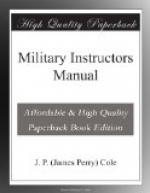“Success in battle is the ultimate object of all military training.”
School of the Soldier.
INSTRUCTION WITHOUT ARMS.
The object of the facings and marchings is to give the soldier complete control of his body in drills so that he can move easily and promptly at any command.
Attention.
POSITION OF ATTENTION.—This is the position a soldier assumes when in ranks or whenever the command attention is given.
In the training of anyone nothing equals the importance of a proper posture; it is the very foundation upon which the entire fabric of any successful training must be founded.
Instructors must persist in the development of this position until the men assume it from habit.
At the command, 1. Company (Squad, etc.), 2. Attention, the following position is assumed:
1. HEELS TOGETHER AND ON A
LINE.—If the heels are not on a line,
the hips and sometimes even the shoulders, are thrown
out of line.
2. FEET TURNED OUT EQUALLY,
FORMING AN ANGLE OF 45 DEGREES.—If the
feet are not turned out equally, the result will be
the same as above.
3. KNEES EXTENDED WITHOUT STIFFNESS.—Muscles
should be contracted
just enough to keep the knees straight. If locked,
men tire easily and faint if at attention a long time.
4. THE TRUNK ERECT UPON THE
HIPS, the spine extended throughout its
entire length; the buttocks well forward.
The position of the trunk, spine
and buttocks is most essential. In
extending the spine the men must feel that the trunk
is being stretched up from the waist until
the back is as straight as it can be made.
In stretching the spine the chest
should be arched and raised,
without, however, raising the shoulders
or interfering with natural respiration.
5. SHOULDERS FALLING NATURALLY
and moved back until they are square.
Being square, means having the shoulder
ridge and the point of the
shoulder at right angles to a general anterior-posterior
plane running through the body. They should never
be forced back of this plane, but out rather in line
with it.
6. ARMS HANGING NATURALLY,
thumbs against the seams of the trousers,
fingers extended, and back of hand turned out.
The arms must not be forcibly extended
nor held rigidly; if they are,
a compensating faulty curve will occur in the lumbar
region.
7. HEAD ERECT, CHIN RAISED
until neck is vertical, eyes fixed upon
some object at their own height.
Every tendency to draw the chin
in must be counteracted.
8. When this position is correctly
assumed, the men will be taught to
incline the body forward until the weight rests
chiefly upon the balls of the feet, heels resting
lightly upon the ground.
When properly assumed, a vertical
line drawn from the top of the head
should pass in front of the ear, shoulder and thighs,
and find its base at the balls of the feet.
Every tendency toward rigidity must
be avoided; all muscles are
contracted only enough to maintain this position,
which is one of co-ordination, of physical and
mental alertness, that makes for mobility, activity
and grace. A man who faints standing at attention
has not taken the proper position.




